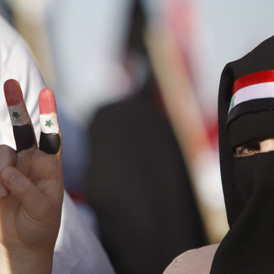EU steps up Syria sanctions as young ‘hero’ speaks out
The EU puts pressure on Syria’s President Bashar al-Assad over the treatment of protesters, as Foreign Affairs Correspondent Jonathan Rugman reveals the strange tale of one of the uprising’s heroes.
Foreign ministers agreed at a meeting in Brussels to impose travel bans and asset freezes on Assad and nine other officials.
The EU had already imposed sanctions on the president’s brother, four of his cousins and his closest allies, along with an arms embargo.
‘Restrictive measures’
In a statement, the 27 foreign ministers said they had “decided to further strengthen these restrictive measures by designating additional persons, including at the level of he highest leadership”.
“The EU is determined to take further measures without delay should the Syrian leadership choose not to change its current path,” they added.
Syria: Documenting the uprisings
Ahmad Bayasi has become a hero of the Syrian uprising after footage he filmed of the crackdown was posted online.
State TV denied it was in Syria, but the 22 year-old contradicted those claims by showing his Syrian ID card.
He describes how army commandos rounded up local men and handcuffed them with telephone wires. "I was lying just here" he says "and after beating me here they took me to jail". After that more men appear, showing the camera their injuries.
After daring to speak out about this ordeal Ahmad Bayasi was arrested. A leading Syrian Human rights group said he had been eleoctrocuted and lost consciousness at the hands of the secret police.
But he was later shown on state television, proving he was still alive.
He said: "When they said I was tortured and killed I was surprised. No one has imprisoned me. And I am leading a normal life".

‘Embarrassing sanctions’
But director of the Centre for Middle Eastern Studies at the University of Oklahoma and administrator of the Syria Comment blog, Joshua Landis, told Channel 4 that those sanctions will not work.
“These sanctions are embarassing,” Mr Landis said.
“They set out a marker on where the west is heading. Clearly Europe is thinking seriously about stopping Assad.
Intervention will only raise the body count. And if you intervene you’ll most likely get chaos and civil war. If they want to curb the death rate, they have to put up with Assad. Joshua Landis, Syrian expert
“But they’re leaving themselves in an escape hatch. They don’t want to tie their hands completely because they won’t be able to lift the sanctions and Assad will never satisfy the demands to lift the reigns of power.”
Deadly protests are continuing in the country, with another five people killed in Homs on Saturday.
Activists say they were holding funeral processions for dozens of protesters killed by security forces during demonstrations on Friday.
Sectarian issues
Mr Landis warned that any intervention would cause more bloodshed and stoke sectarian issues.
“It wouldn’t do any good. Intervention will only raise the body count. And if you intervene you’ll most likely get chaos and civil war.
“If they want to curb the death rate, they have to put up with Assad”
He told Channel 4 News that the political situation would continue to remain fragile for a long time yet.
“There’s no leadership to the opposition so if things fall apart there won’t be any order.
“Even if the military crumbles as it did in Iraq, there’s no one to guide Syria and we’re likely to see the rise of armed militia.”
But Mr Landis said that bringing down the economy was the most likely way of removing Assad’s regime from power.
“It’s possible that if the economy can be brought down, the state will start to fall to pieces.
“The government won’t be able to pay salaries and then the military will stop remaining loyal.”
The government has condemned the EU sanctions, with state TV saying they are “an attempt to destabilise its security”.
Human rights activists say more than 850 people have been killed and thousands arrested since the operation to quell dissent began in March.
-
Latest news
-
Ex-Trump lawyer Michael Cohen testifies at hush money trial3m

-
Racial hate speech laws being ‘weaponised’ warns National Black Police Association7m

-
‘Hard to believe so many women going through such horrors’, says woman whose baby daughter was stillborn8m

-
Damning report condemns ‘shockingly poor’ UK maternity services12m

-
People ‘expecting the West to stand by Georgia’, says opposition party leader5m

-





